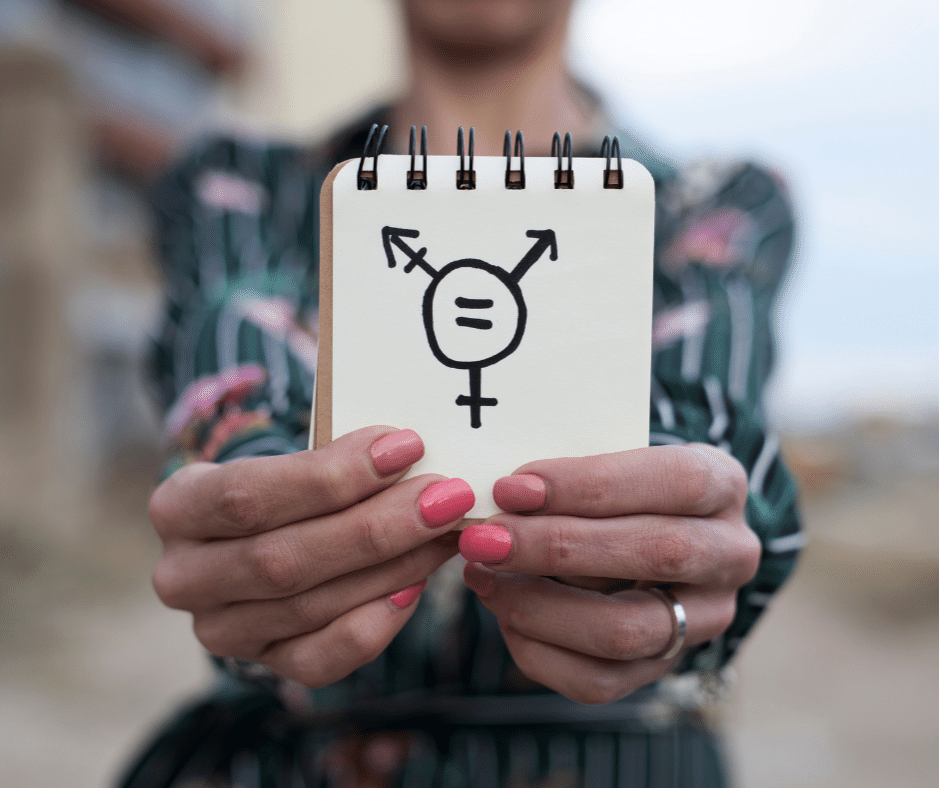“𝐼𝑛 𝑡ℎ𝑒 𝑈𝑛𝑖𝑡𝑒𝑑 𝑆𝑡𝑎𝑡𝑒𝑠, 71% 𝑜𝑓 𝑡ℎ𝑒 𝑝𝑜𝑝𝑢𝑙𝑎𝑡𝑖𝑜𝑛 ℎ𝑎𝑣𝑒 𝑛𝑒𝑣𝑒𝑟 𝑘𝑛𝑜𝑤𝑖𝑛𝑔𝑙𝑦 𝑖𝑛𝑡𝑒𝑟𝑎𝑐𝑡𝑒𝑑 𝑤𝑖𝑡ℎ 𝑎 𝑡𝑟𝑎𝑛𝑠𝑔𝑒𝑛𝑑𝑒𝑟 𝑝𝑒𝑟𝑠𝑜𝑛, 𝑜𝑟, 𝑎𝑠 𝐼 𝑙𝑖𝑘𝑒 𝑡𝑜 𝑠𝑎𝑦, 𝑎 “𝑝𝑒𝑟𝑠𝑜𝑛 𝑜𝑓 𝑡𝑟𝑎𝑛𝑠𝑔𝑒𝑛𝑑𝑒𝑟 𝑒𝑥𝑝𝑒𝑟𝑖𝑒𝑛𝑐𝑒.” 𝑁𝑒𝑒𝑑𝑙𝑒𝑠𝑠 𝑡𝑜 𝑠𝑎𝑦, 𝑡ℎ𝑒𝑟𝑒 𝑎𝑟𝑒 𝑚𝑎𝑛𝑦 𝑝𝑒𝑜𝑝𝑙𝑒 𝑤𝑖𝑡ℎ 𝑎 𝑙𝑜𝑡 𝑜𝑓 𝑞𝑢𝑒𝑠𝑡𝑖𝑜𝑛𝑠.” – says Corey Rae, transgender activist, actress, and model.
A lot of questions, that’s for sure, but also a lot of prejudice and irrealistic expectations.
Gender is tricky to define, and it is often influenced by what we have all been taught about what a man and a woman should look like and how they should behave. This social construct, rooted in power and intertwined with the patriarchal model of existence, does not consider the fact that gender is fluid. Being assigned a gender at birth for some, like transgender women, is tricky; it is also dangerous. As trans women do not identify with the genre that society has chosen for them, they are more susceptible to exclusion, discrimination, and lack of power.
There aren’t many resources and education around trans women, their sexuality, and their bodies, which leads to trans women being ridiculously stigmatized in our society and often confronted with ignorant comments and questions. Trans women are seen as different or shameful and are too often targets of hate crimes and other forms of violence and discrimination at work, in public spaces, and in their private and sexual lives.
Violence, Discrimination, and Transphobia
In the summer of 2015, the National Center on Transgender Equality conducted their 2015 U.S. Transgender Survey, involving nearly 28,000 respondents across the United States. The results showed that transgender people were twice as likely to be living in poverty as the general American population. On top of that, they also experienced difficulties accessing income supports because of bias and prejudice. Nearly 1 in 5 respondents reported that they had received negative treatment, including being denied access to the service, verbally harassed, or physically attacked, when they went to benefits or another public office.
Respondents also experienced high levels of mistreatment by the police, including verbal harassment and physical and sexual assault. It does not come as a surprise that many cases of violence or discrimination perpetrated against transgender people are not reported or that the trans community does not trust law enforcement.
And things do not get better in private life. According to the survey, those transgender people who were out to a current or former partner had a partner end their relationship solely or partly because they were transgender in 26% of the cases. Nearly 16% of those respondents who came out to their children had a child stop speaking to them or spending time with them. Almost half also experienced family rejection, such as a family member who stopped speaking to them for a long time or ended the relationship, violence by a family member or being kicked out of the house for being transgender. Transgender women were more vulnerable and twice as likely to experience violence by a family member or being kicked out of the house because of their gender identity.
The situation is even worse for Black trans people. According to the 2015 U.S. Transgender Survey, 20% of Black transgender people were unemployed, twice the rate among Black people in the U.S., and 38% lived in poverty. 34% of respondents who saw a healthcare provider reported having at least one negative experience related to being transgender, including being refused treatment, being verbally harassed, being physically or sexually assaulted, or teaching the provider about transgender people to receive appropriate care.
It is estimated that more than 44 transgender or gender non-conforming people have been fatally shot or killed in 2020, and the majority of them were Black and Latinx transgender women.
Only by examining the average life expectancy of Black trans women in the United States, compared to their cisgender counterparts, we can see a striking difference. While the life expectancy of a Black cisgender woman is 78 years old, Black trans women live 35 years on average. Shocking, right?! And it is even more disturbing when we consider that one of the main causes behind this huge difference is the alarming rates of Black trans women who are being murdered every day. The combination of racism, sexism, homophobia, and transphobia is a powerful mix that impacts many Black trans women, depriving them of employment, housing, healthcare, and even their own lives.
Trans women who made history
It’s very important to support our trans sisters, not make assumptions, minimize their struggles, and keep the communication open. We can do that by honoring the lives and the contribution that some of them made to the cause and society as a whole.
Monica Roberts
Monica Roberts was a Houston-based journalist who advocated for the transgender community. She, unfortunately, passed away on October 5th, 2020, but her work is still very relevant.
Roberts founded the TransGriot in 2006, a blog focusing on trans women’s issues, with a strong accent on Black trans women’s stories and struggles. Roberts’s efforts and her coverage of transgender homicide victims in the United States finally brought attention to the crisis. They forced people to become more aware of the transgender community’s challenges and needs.
She received several awards for her activism and log, including the HRC John Walzel Equality Award from the Human Rights Campaign in 2017 and the Outstanding Blog at the GLAAD Media Award in 2018. As a writer, her work also appeared in Ebony, The Huffington Post, Transadvocate, and many other publications.
Monica Roberts represents today a role model for many transgender people. She became what she wished she had when she was a child struggling with her gender identity: an example and a guide for young people to look up to.
Read more about her story here.
Sarah McBride
It is almost impossible to talk about trans women’s achievements, without talking about Sarah McBride.
Now a Democratic member of the Delaware Senate since January 2021, McBride is the first transgender state senator in the country and the highest-ranking transgender elected official in United States history. Her overwhelming victory at Delaware’s 1st District in November 2020 made history, not just for herself but for the entire transgender community.
McBride has always been very active in defending transgender people’s rights. In 2013, she advocated for the passage of Delaware’s gender identity non-discrimination act, which is now law, and in 2016 she was the first trans woman to speak at a major party event, the Democratic National Convention.
Sarah McBride’s achievements are tangible proof that transgender people are gaining more and more influence in politics and society and give hope to countless trans people.
Next step? The Congress, of course!
Read more about her story here.
Femininity is much broader than simply being born in a female body. It’s energy within, a sensual, warm power. Building your femininity and sensuality every day, defending it from the attacks of toxic masculinity, can be exhausting, especially if you’re not born in a female body.
But you can always count on a tribe of like-minded, open, and liberated women to have your back. That’s what we, at Fusion Movement, want to create. It is a safe, inclusive space for all those individuals who identify as women to freely express themselves, connect, and build a powerful network to enact positive change and dismantle any kind of social prejudice around women and their bodies.




